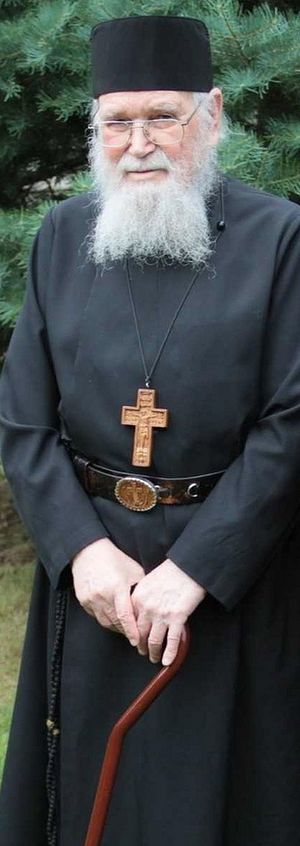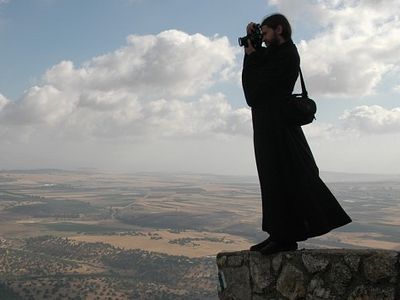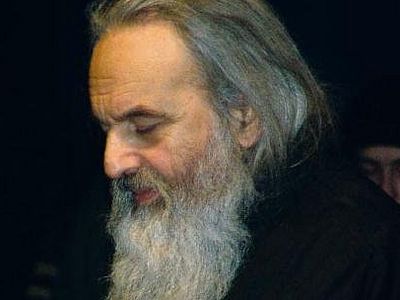In writing about this subject I have both fear and compassion: fear because of my lack of qualification to make a sophisticated analysis, yet being aware of growing trust in the field within the Church, I am stirred with compassion in concern for the Orthodox faithful. This is not a sophisticated analysis, but I will share some thoughts for consideration on this subject, most of which are quotations from others. It must be noted, however, that the final conclusion is meant to be a general statement and is not meant to be an absolute for each person.
Archimandrite Sophrony teaches that just as in the Liturgy during the Cherubimic Hymn the priest prays, “No one is worthy” [that is, to perform the Divine Liturgy], so also no one is capable of being a spiritual father. He further explains that this is so because a spiritual father is a co-worker with God in the creation of immortal gods. Here, of course, his is implying our call to deification. He, and others that I have conversed with on this subject, have stressed the fact that a spiritual father must be a man of prayer. Although it is necessary to be familiar with the ascetic tradition of the Church, and things that one has read may come to mind, above all a spiritual father must be seeking God’s help through prayer. So now, let me go on to share a few thoughts for consideration:
I posed the following question to a father from Athos who wished to remain unidentified (he was a doctor before becoming a monastic): “I have run across priests in the Church who rely much on modern psychology in their counseling. Is it possible for us to turn to psychology?” He answered:
We trace the teachings of our holy fathers back to the fourth century but psychology has its roots only back to the sixteenth or seventeenth century in the non-Orthodox West. In psychology they do discover some things that are useful but our fathers already knew these things for over a millennium. In the West there is a problem: it is believed that the thoughts and mind are one. However, according to the teaching of the Orthodox Church the mind and thoughts are not one, but two; and the mind must be cleansed of wrong thoughts that pass through it.
The development of psychology can be traced to problems in Western Christianity in reference to salvation. In Catholicism salvation is a black and white systematic observance of rules and the performance of good works. This is said to give each person their own merit towards the salvation of one’s soul. In Protestantism salvation is thought to be only a matter of a confession of faith, and it is believed therefore that your name is written in the Book of Life. But in Orthodoxy salvation is a process of working to cleanse the inner man. In this process there are three stages of grace: the first is that of cleansing, the second enlightenment, and the third perfection, which is rare. We must repent and become cleansed of our wrong thoughts and sins, and then the mind can become enlightened by receiving thoughts of God.
Psychology evolved in the West because Christians in the West do not understand the need for cleansing the thoughts. The thoughts that go through one’s mind can drive one to a state of mental illness, and so psychology tries to keep the mind occupied with other things in order to avoid this. Psychologists can therefore sometimes be helpful in keeping someone from going further into mental illness, but psychology cannot actually heal the soul.
In reference to this, something was said by a novice at my former monastery. He quoted a relative of his who works as a psychologist and has written books in this field, who said: “We psychologists are like a sponge. We soak up people’s problems but we cannot heal them.”
When I was a deacon, a young man who visited our monastery had just received a bachelor’s degree in psychology. I asked him: “Is it a good idea for me as a spiritual father to study some psychology for this ministry?” He answered: “No, you will learn nothing new for your spiritual ministry, but it will help you to be able to correct their errors.”
One priest told me of a friend of his who suggested he read a book on psychology. This man told him that although not everything in the book was proper teaching, there were some good points. This priest said this man was indeed very perceptive in what he saw. However he noticed a change in this man’s way of thinking from having read the book. He became very skeptical, and through deductive reasoning, sought proofs and systematic explanations for matters of faith. He sought to analyze and give rational explanations for mysteries of faith which cannot be subject to this. As a result of this, his simple faith was harmed.
I know a former priest who at one time was very enthusiastic about a parishioner who was a psychologist and whose forte was group therapy. He introduced this practice at his parish and began reading books on psychology. He had personal struggles in his marriage and as a result of his reading in psychology, he concluded that what he needed was a real relationship with a “good” woman. He wound up leaving the priesthood and his wife, and remarried.
In a conversation with Bishop Basil Rodzianko (a large section in the popular book Everyday Saints is dedicated to him) he commented: “Both the Church and psychology agree that guilt will drive a man crazy. In the Church we deal with this through repentance but in psychology they try to use other methods.”
Someone I am acquainted with and who spent some time at Holy Transfiguration Monastery at Elwood City, Pennsylvania, told me the following: “I was having some difficulty with anger, and our chaplain, Fr. Roman, was away. I told a visiting priest of my struggle. He said I needed to go through the past and heal the inner child. This priest thought therapy would be helpful. When Fr. Roman returned I asked him if I should do this and he replied, ‘No, you will only give tools to the demons.’”
I believe Fr. Roman was concerned about reintroducing old temptations and breaking open old wounds. I learned from a psychologist that their aim in this is to remove stumbling blocks from the past which can cause abnormal behavior. This brings up a question: Which approach is the best? I will offer some reflections and let the readers decide for themselves.
Speaking of recalling the past brings to mind a letter of the twentieth century elder, Fr. John of Valaam. Concerning memory he writes:
Imagination and memory are one inner sense. Sometimes the memory of former events hits us on the head like a hammer. At such time concentrated prayer is needed, and patience too. Our memory must be filled by reading the Holy Gospel and the writings of the Holy Fathers; in other words, the mind should not be idle. Former events must be replaced by other thoughts, and gradually the former recollections will be crowded out and the melancholy will pass. In one heart two masters cannot live together.[1]
Another acquaintance told me something with some relation to this:
When I visited St. John the Baptist Monastery in England I had the blessing of speaking with Fr. Sophrony. I had questions written down which the abbot, Fr. Kyril, read to him ahead of time. When we sat down to talk Fr. Sophrony first asked me: “Where did you study psychology?” I was amazed to hear him say that, and it is true that I did have one semester of psychology in college, for which I had an avid interest. He felt I was over-examining and over-analyzing myself. He stated: “There are some who have done this and have become saints,” (I think he had St. John Climacus in mind who in his Ladder of Divine Ascent examined the passions and spoke of the action of virtue in detail) and Father continued: “This was not the way for St. Silouan and this is not the way for us. The way for me is straight ahead.”
Let me comment on the words: “The way for me is straight ahead.” St. Seraphim has said that the aim of Christian life is to acquire the grace of the Holy Spirit. We do need to be aware of our faults and confess them. But rather than trying to examine and fix everything that appears to be wrong with us, we should go straight ahead and seek to acquire the grace of the Holy Spirit. As we grow in the grace of God the hold that the passions have on us will lessen. All our weaknesses and sicknesses of soul will also become easier to bear. The above mentioned words of the Elder John of Valaam are quite applicable if we replace the word “memory” with “soul” and “melancholy” with “passions, etc.:”
Our memory [or soul] must be filled by reading the Holy Gospel and the writings of the Holy Fathers; in other words, the mind should not be idle. Former events must be replaced by other thoughts, and gradually the former recollections will be crowded out and the melancholy [or passions etc.] will pass. In one heart two masters cannot live together.
Psychology has a different approach. One hieromonk who studied at St. Tikhon’s commented: “Psychology is a secular form of Eastern religion. Psychologists try to put all the parts in the right place.” They can even appear to perfect that which according to the image of God is in one’s self. But, Fr. Sophrony comments, concerning those who experience some state of perfection in Eastern religion: “The God of all is not in this.”
In conclusion I leave you with a comment by Archimandrite Sophrony: “Psychology is not profitable for those in the Church. A spiritual father helps those who come to him because he has gone through similar struggles and has learned from what he has suffered.”







